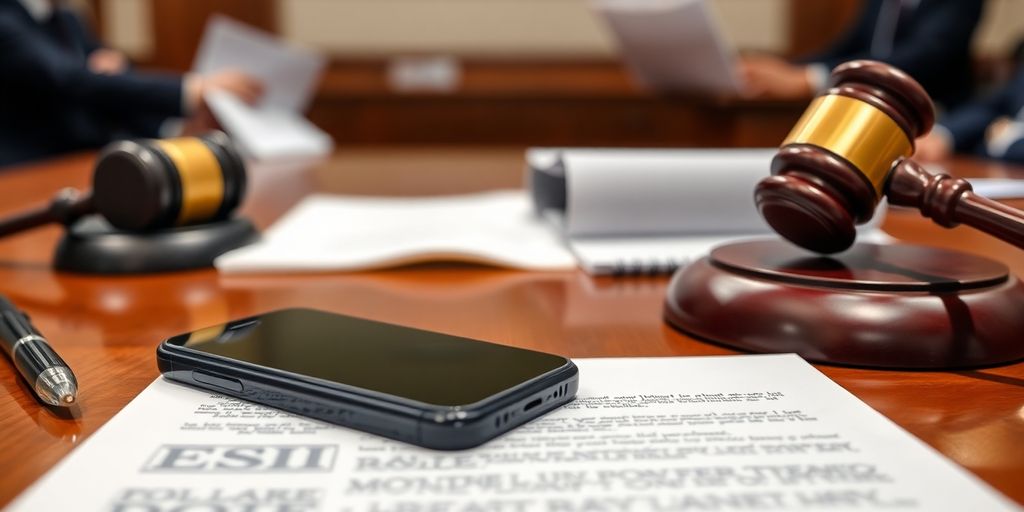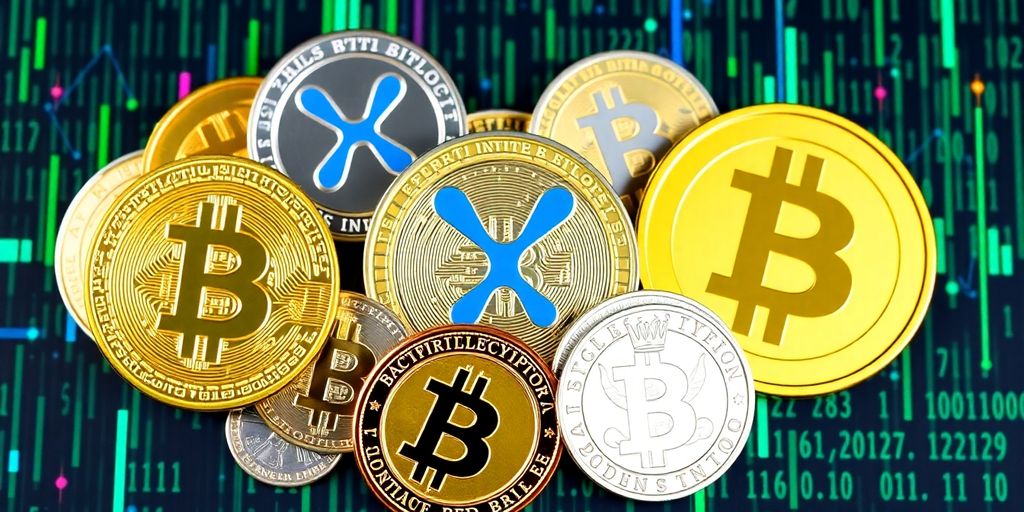In a significant development in the ongoing money laundering trial of social media personality Ismaila Mustapha, known as Mompha, the Ikeja Special Offences Court has accepted his iPhone as evidence. This decision raises important questions about the role of digital evidence in legal proceedings and the implications it has for future cases.
Key Takeaways
- The court admitted Mompha’s iPhone as evidence in a ₦6 billion money laundering case.
- Forensic analysis of the iPhone was conducted by the FBI, revealing fraudulent documents.
- Mompha’s defense argued against the admission, claiming a lack of foundational evidence.
- The judge overruled the defense’s objections, emphasizing the prosecution’s arguments.
- This ruling could set a precedent for how digital evidence is treated in future trials.
Understanding the Court’s Decision to Admit Mompha’s iPhone

In the recent trial concerning alleged ₦6 billion money laundering, the court’s decision to admit Mompha’s iPhone as evidence has raised significant discussions. This decision is pivotal as it sets a precedent for how digital evidence is treated in legal proceedings.
Legal Implications of Admitting Digital Evidence
Admitting digital evidence like an iPhone can have profound legal implications. Here are some key points to consider:
- Establishes a framework for future cases involving digital devices.
- Challenges traditional evidence rules, especially regarding the chain of custody.
- Increases reliance on forensic analysis in court.
Role of the iPhone in the Money Laundering Case
The iPhone is not just a device; it is a potential treasure trove of evidence. During the trial, it was revealed that:
- The phone was used to store fraudulent documents.
- It underwent forensic analysis by the Federal Bureau of Investigation (FBI).
- The evidence retrieved could directly link Mompha to the alleged crimes.
Court’s Rationale Behind the Decision
The court, led by Justice Mojisola Dada, overruled objections from the defense, emphasizing:
- The prosecution’s arguments were compelling enough to admit the evidence.
- The absence of a certificate did not invalidate the evidence’s relevance.
- The need for thorough investigation in financial crimes necessitated the use of digital evidence.
The admission of Mompha’s iPhone as evidence marks a significant step in how courts view and utilize digital devices in financial crime cases. This decision could influence future trials and the handling of digital evidence in Nigeria.
Background of the Money Laundering Charges Against Mompha
Overview of the ₦6 Billion Fraud Case
In this case, we are dealing with serious allegations against Ismaila Mustapha, known as Mompha. He is accused of being involved in a ₦6 billion fraud scheme. This amount is significant and highlights the scale of the alleged criminal activities. Mompha is not alone in this; he is also facing charges alongside his company, Ismalob Global Investment Ltd.. Together, they are being prosecuted on eight counts related to money laundering.
Key Players Involved in the Trial
The trial involves several key players:
- Ismaila Mustapha (Mompha): The main defendant, a social media celebrity.
- Ismalob Global Investment Ltd.: Mompha’s company, implicated in the charges.
- Economic and Financial Crimes Commission (EFCC): The agency leading the investigation.
- Justice Mojisola Dada: The presiding judge overseeing the trial.
Timeline of Events Leading to the Trial
The events leading to this trial have been complex and drawn out. Here’s a brief timeline:
- Initial Investigation: The EFCC began investigating Mompha and his company.
- Charges Filed: After gathering evidence, the EFCC filed charges against Mompha and Ismalob Global Investment Ltd.
- Court Proceedings: The trial commenced, with various hearings and testimonies.
- Admission of Evidence: Recently, the court admitted Mompha’s iPhone as evidence, which is crucial for the prosecution.
The ongoing trial not only focuses on the alleged crimes but also on the implications for digital evidence in legal proceedings.
This background sets the stage for understanding the complexities of the case and the serious nature of the charges against Mompha.
The Role of the Economic and Financial Crimes Commission (EFCC)

EFCC’s Investigation Process
The Economic and Financial Crimes Commission (EFCC) plays a crucial role in tackling financial crimes in Nigeria. Their investigation process typically involves:
- Gathering intelligence from various sources, including international agencies.
- Conducting thorough forensic analysis of evidence, such as digital devices.
- Collaborating with other law enforcement agencies to build a strong case.
Collaboration with International Agencies
The EFCC often works with international organizations to enhance its effectiveness. This collaboration includes:
- Sharing information and resources with agencies like the FBI.
- Participating in joint operations to combat cross-border financial crimes.
- Engaging in training programs to improve investigative techniques.
Impact of EFCC’s Findings on the Case
The findings from the EFCC’s investigations can significantly influence legal proceedings. For instance:
- Evidence collected can lead to the admission of crucial exhibits in court, such as digital devices.
- Their reports can shape public perception and media coverage of high-profile cases.
- Successful prosecutions can set a precedent for future financial crime cases in Nigeria.
The EFCC’s commitment to enforcing anti-money laundering laws is vital for restoring public trust in Nigeria’s financial systems. Their efforts are essential in the fight against corruption and financial crimes.
Forensic Analysis of Mompha’s iPhone
Involvement of the Federal Bureau of Investigation (FBI)
In this case, the FBI played a crucial role in analyzing Mompha’s iPhone. The phone was seized during the investigation and sent to the FBI for a thorough forensic examination. This step was essential to ensure that any evidence retrieved was reliable and could be used in court.
Types of Evidence Retrieved from the Device
The forensic analysis of the iPhone revealed several types of evidence that are significant to the case. Some of the key findings include:
- Fraudulent documents that were allegedly used in the money laundering activities.
- Communication records that may link Mompha to other individuals involved in the fraud.
- Financial transactions that could provide insight into the flow of illicit funds.
Significance of Forensic Evidence in Court
The evidence obtained from the iPhone is vital for the prosecution. It not only supports the claims against Mompha but also helps establish a clearer picture of the alleged money laundering scheme. The court’s decision to admit this evidence marks a significant moment in the trial, as it sets a precedent for how digital evidence can be utilized in similar cases.
The admission of digital evidence like Mompha’s iPhone highlights the evolving nature of legal proceedings in the digital age.
By understanding the forensic analysis process and the types of evidence retrieved, we can appreciate the complexities involved in modern financial crime investigations. This case serves as a reminder of the importance of technology in uncovering the truth behind financial misconduct.
Legal Challenges Faced During the Trial
Defense’s Objections to the iPhone’s Admission
During the trial, we encountered significant legal hurdles regarding the admission of Mompha’s iPhone as evidence. The defense team raised several objections, arguing that the prosecution had not laid a proper foundation for the iPhone’s admission. They claimed that without a certificate of authenticity, the evidence should be dismissed. This led to a tense exchange in court, where the defense insisted that the prosecution’s arguments were insufficient to justify the iPhone’s inclusion as Exhibit P7.
Prosecution’s Counterarguments
In response, the prosecution countered the defense’s claims by emphasizing the importance of the evidence. They argued that the iPhone contained crucial information related to the alleged money laundering activities. The prosecution highlighted the following points:
- The iPhone was analyzed by the FBI, which provided credible forensic evidence.
- Documents retrieved from the device were directly linked to the charges against Mompha.
- The evidence was essential for establishing a connection between Mompha and the alleged criminal activities.
Judge’s Ruling on the Objections
Ultimately, the judge, Justice Mojisola Dada, ruled in favor of the prosecution, overruling the defense’s objections. This decision marked a pivotal moment in the trial, as the court recognized the iPhone’s potential to provide significant insights into the case. The ruling not only allowed the iPhone to be admitted as evidence but also set a precedent for how digital evidence is treated in future cases.
The admission of digital evidence like Mompha’s iPhone reflects the evolving nature of legal proceedings in the digital age.
In conclusion, the legal challenges faced during the trial underscored the complexities of admitting digital evidence, particularly in high-stakes cases involving money laundering. We must remain vigilant and prepared for similar challenges in future trials involving technology and digital evidence.
Implications of the Court’s Ruling on Future Cases
Setting a Precedent for Digital Evidence
The recent ruling by the court to admit Mompha’s iPhone as evidence marks a significant moment in legal history. This decision sets a precedent for how digital evidence can be treated in future cases. We believe that this ruling will encourage other courts to consider digital devices as valid evidence in similar trials.
Potential Impact on Similar Money Laundering Cases
As we analyze the implications of this ruling, we can foresee several potential impacts:
- Increased scrutiny of digital evidence in financial crime cases.
- Greater collaboration between local and international law enforcement agencies.
- Enhanced training for legal practitioners on handling digital evidence.
Legal Community’s Reaction to the Ruling
The legal community has shown a mixed reaction to this ruling. Some practitioners argue that the admission of digital evidence could lead to more convictions in financial crimes, while others express concerns about the validity of such evidence. Overall, this ruling is likely to spark discussions on the application of the money laundering prohibition act and its implications for legal practitioners.
The court’s decision to admit digital evidence like Mompha’s iPhone could reshape how we approach financial crime investigations in the future.
In conclusion, the implications of this ruling extend beyond this case, potentially influencing how future cases involving digital evidence are handled in the legal system.
Public and Media Reaction to the Trial
Coverage by Major News Outlets
The trial of Ismaila Mustapha, known as Mompha, has captured significant attention from various media outlets. Major news organizations have been closely following the developments, particularly after the court admitted his iPhone as evidence. This decision has sparked discussions about the implications of digital evidence in legal proceedings. Here are some key points from the coverage:
- The admission of the iPhone as Exhibit P7 has been highlighted as a pivotal moment in the trial.
- Reports emphasize the role of the Economic and Financial Crimes Commission (EFCC) in the investigation.
- The media has also focused on the potential impact of this case on future money laundering trials.
Public Opinion on the Court’s Decision
Public reaction to the court’s ruling has been mixed. Many individuals express concern over the use of digital evidence, while others support the court’s decision. Some notable opinions include:
- Support for the ruling, viewing it as a necessary step in combating financial crimes.
- Skepticism about digital evidence, with questions about its reliability and the methods used to obtain it.
- Calls for transparency in the judicial process, emphasizing the need for clear guidelines on digital evidence.
Influence of Social Media on Public Perception
Social media platforms have played a crucial role in shaping public perception of the trial. Discussions and debates are rampant, with users sharing their views on the implications of the court’s decision. Key trends include:
- Hashtags related to the trial trending on platforms like Twitter and Instagram.
- Influencers and public figures weighing in on the case, further amplifying the conversation.
- A growing concern about the potential for misinformation regarding the trial’s proceedings.
The admission of Mompha’s iPhone as evidence marks a significant moment in the ongoing battle against money laundering in Nigeria. It raises important questions about the future of digital evidence in courtrooms.
Mompha’s Legal Strategy Moving Forward

Defense Team’s Next Steps
As we look ahead, our defense team is preparing to tackle the challenges posed by the court’s recent decision. Here are the key steps we plan to take:
- Review the iPhone Evidence: We will thoroughly analyze the data retrieved from Mompha’s iPhone to identify any weaknesses in the prosecution’s case.
- Challenge Forensic Methods: We will question the methods used by the FBI in their forensic analysis to ensure they meet legal standards.
- Gather Counter Evidence: Our team will work to collect evidence that contradicts the claims made by the prosecution regarding the iPhone’s use in illegal activities.
Possible Appeals and Legal Maneuvers
In light of the court’s ruling, we are also considering several legal maneuvers:
- File an Appeal: If necessary, we may appeal the decision to admit the iPhone as evidence, arguing that proper procedures were not followed.
- Request a Hearing: We might request a hearing to present our objections to the admissibility of the evidence.
- Negotiate with Prosecution: We will explore the possibility of negotiating with the prosecution for a favorable resolution.
Impact of the iPhone Evidence on Defense Strategy
The admission of the iPhone as evidence significantly impacts our defense strategy. We must adapt quickly to address the prosecution’s claims while maintaining a strong defense.
- We will focus on discrediting the evidence linked to the iPhone.
- Our strategy will include emphasizing the lack of direct evidence connecting Mompha to the alleged money laundering activities.
- We will also highlight any procedural errors made during the investigation that could undermine the prosecution’s case.
In navigating this complex legal landscape, we remain committed to ensuring that justice is served and that Mompha’s rights are protected throughout the trial process.
The Broader Context of Money Laundering in Nigeria

Money laundering is a significant issue in Nigeria, affecting the economy and society at large. Nigeria has faced serious challenges in combating this crime, which often involves complex networks and large sums of money. Here, we will explore the broader context of money laundering in Nigeria, focusing on the following key areas:
Overview of Money Laundering Laws in Nigeria
- The Money Laundering (Prohibition) Act was established to combat financial crimes.
- The Financial Action Task Force (FATF) has highlighted Nigeria’s deficiencies in addressing money laundering.
- Recent developments show that Nigeria was greylisted in 2023 due to rising capital inflows and issues in combating money laundering.
Challenges in Prosecuting Financial Crimes
- Corruption within law enforcement agencies hampers investigations.
- Lack of adequate resources and training for investigators.
- Complex financial systems make it difficult to trace illicit funds.
Role of Technology in Modern Money Laundering
- Criminals increasingly use technology to hide their activities.
- Digital currencies and online platforms facilitate money laundering.
- Law enforcement agencies are adapting by using advanced forensic tools to track illicit transactions.
In our experience, addressing money laundering requires a multi-faceted approach, combining legal reforms, technological advancements, and international cooperation to effectively combat this pervasive issue.
Conclusion
In conclusion, the ongoing trial of Ismaila Mustapha, known as Mompha, has taken a significant turn with the court’s acceptance of his iPhone as evidence in a money laundering case involving ₦6 billion. This decision highlights the importance of digital evidence in modern legal proceedings. As the trial continues, it will be crucial to see how the evidence presented will impact the case. The court’s ruling not only sets a precedent for future cases involving digital devices but also emphasizes the role of technology in uncovering financial crimes. The next hearing is scheduled for January 3, 2025, and many will be watching closely to see how this high-profile case unfolds.
Frequently Asked Questions
What is the main reason the court admitted Mompha’s iPhone as evidence?
The court accepted the iPhone because it was linked to the investigation and had important information that could help prove the case.
Who is Mompha and what are the charges against him?
Mompha, whose real name is Ismaila Mustapha, is a social media celebrity facing charges of money laundering related to a ₦6 billion fraud.
What kind of evidence was found on Mompha’s iPhone?
Investigators found documents that were believed to be involved in fraudulent activities on Mompha’s iPhone.
How did the FBI get involved in this case?
The FBI helped with the investigation by analyzing the iPhone and providing forensic evidence to the court.
What objections did Mompha’s lawyers raise against the iPhone’s admission?
Mompha’s lawyers argued that the prosecution did not follow proper legal procedures to admit the iPhone as evidence.
What did the judge decide regarding the objections?
The judge ruled in favor of admitting the iPhone as evidence, stating that the prosecution had made a strong enough case.
How might this case affect future legal cases involving digital evidence?
This case could set a new standard for how digital evidence is treated in court, making it easier to use similar evidence in future cases.
What has been the public reaction to this trial?
The public has shown a lot of interest, with many discussing the case on social media and in news outlets.





